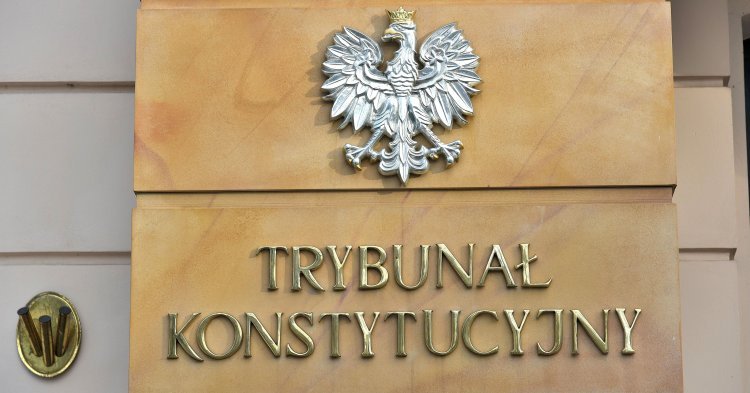If one tried to personify the biggest challenge to the European Union as a political and legal union, one would most certainly not think of Julia Przyłębska, the current President of the Polish Constitutional Court. The former diplomat had a long and successful career advancing German-Polish relations, before returning to the judiciary in 2007 and being named President of the Court in 2016. Yet, Przyłębska and her colleagues on the increasingly controversial Polish Constitutional Court currently represent the greatest threat to the European legal order. With their judgment on the 7th of October, openly defying EU law, they’ve escalated the ensuing rule of law crisis in the EU and massively deteriorated Poland’s already battered relations with its European partners.
What does the judgment of the Constitutional Court on the 7th October say?
To put it simply, the Constitutional Court proclaimed that certain provisions of the EU treaties in their interpretation through the European Court of Justice (ECJ) were violating the Polish constitution and therefore not legally binding in Poland. Specifically, Articles 1 and 19 of the EU-Treaty were declared to be incompatible with the constitution, insofar as they contain specific requirements for the organization of the Polish judiciary.
According to the Polish Constitutional Court, the EU and the ECJ therefore didn’t have the competence to force Poland to abandon certain parts of its “judicial reforms”, which had been heavily criticized for undermining the rule of law and transforming Poland into an authoritarian state. The judgment challenges the supremacy of EU law and its uniform interpretation by the ECJ – fundamental principles of the European Union. The decision thus escalates the ongoing rule of law crisis in Poland onto new heights.
Is Poland moving towards a “Polexit”?
Unsurprisingly, the decision has been harshly condemned by leading voices in Brussels. Ursula von der Leyen described it as a danger to the “foundations of the European Union”, a sentiment that was shared by EP-Vice President Katarina Barley, who saw it as a “blow for the rule of law in Europe”.
Similarly, there is growing outrage about the judgment in Poland itself. Prominent constitutional scholars condemned the decision, whilst tens of thousands of Poles voiced their opposition to the decision in rallies across the country.
Some commentators even speak of a “legal Polexit” from the EU, because the decision puts Poland in open defiance of the foundations of the European treaties. Nonetheless, an actual exit out of the EU, akin to the British withdrawal in 2020, is unlikely. Not only is the Polish population overwhelmingly pro-European. Even Prime Minister Morawiecki, who instigated the procedure leading to this decision of the Constitutional Court, re-affirmed Poland’s strong commitment to the EU in a confrontative speech before the European Parliament on October 19th.
What seems more likely is a gradual disintegration of Poland out of the EU by increasingly ignoring parts of the EU legal order and therefore becoming shut out of cooperation with the other member states. Poland’s relationship to the EU is set to remain strained for years.
How will the EU react?
Prominent voices in Brussels are now calling for serious consequences for Poland. Fearing the deterioration of the European legal order, they call upon the European Commission and the European Council to impose far-reaching sanctions on Poland. The European Parliament is even preparing a lawsuit against the Commission forcing it to react more forcefully to the situation in Poland.
Specifically, three possible paths for the EU emerge:
Firstly, the European Commission could initiate another legal infringement proceeding against Poland for violating fundamental principles of EU law. Should Poland – as has already happened repeatedly – choose to ignore the ensuing judgments of the ECJ, the Court could impose a hefty penalty against Poland. Only last month, Poland was ordered by the ECJ to pay a penalty of 1 million euros for every day of violating a recent ECJ ruling
Further, the EU could impose political sanctions through the so-called “Article 7 – procedure”, which allows the EU to restrict membership rights in case of a “serious and persistent breach” of fundamental values of the EU. The list of possible sanctions includes the restriction of voting rights in the Council of the EU. A successful invocation of Article 7 faces a steep procedural hurdle though: A unanimous vote by the European Council – which seems rather unlikely in the face of its current composition. Several other European governments are also in the spotlight for violations of the Rule of Law and are therefore unlikely to vote to create a precedent for opening new procedures against them.
Lastly, the EU could use the new rule of law mechanism, which has been integrated into the new EU budget in late 2020, to withhold funds set out for Poland. This procedure allows the EU, upon initiation by the European Commission and vote of the Council of the EU, to withhold funds from EU Member States who violate the rule of law principles of the EU. This mechanism has the substantive advantage of producing direct, painful consequences for violations of the rule of law. Poland is a net recipient of EU-funds and is set out to receive 36 billion euros from the NextGenerationEU-budget. Withholding these funds – which amount to 7 % of Poland’s GDP – would put a severe financial strain on the Polish government. Some, however, worry that ordinary Polish citizens would bear the brunt of such sanctions.
Complicating matters further, there is also legal uncertainty about the new rule of law-mechanism: Poland and Hungary are currently petitioning the European Court of Justice to declare it a violation of EU law.
The exact effects of these proposed measures and their ability to influence the Polish government remain unclear at this point. Much depends on the course of the Polish government and whether or not it will budge amidst growing domestic and international pressure. So far, the Polish government has remained bullish and threatened the EU not to “pressurize” or “blackmail” Poland. The European rule of law crisis is therefore most certainly moving into another round.


Follow the comments: |
|
